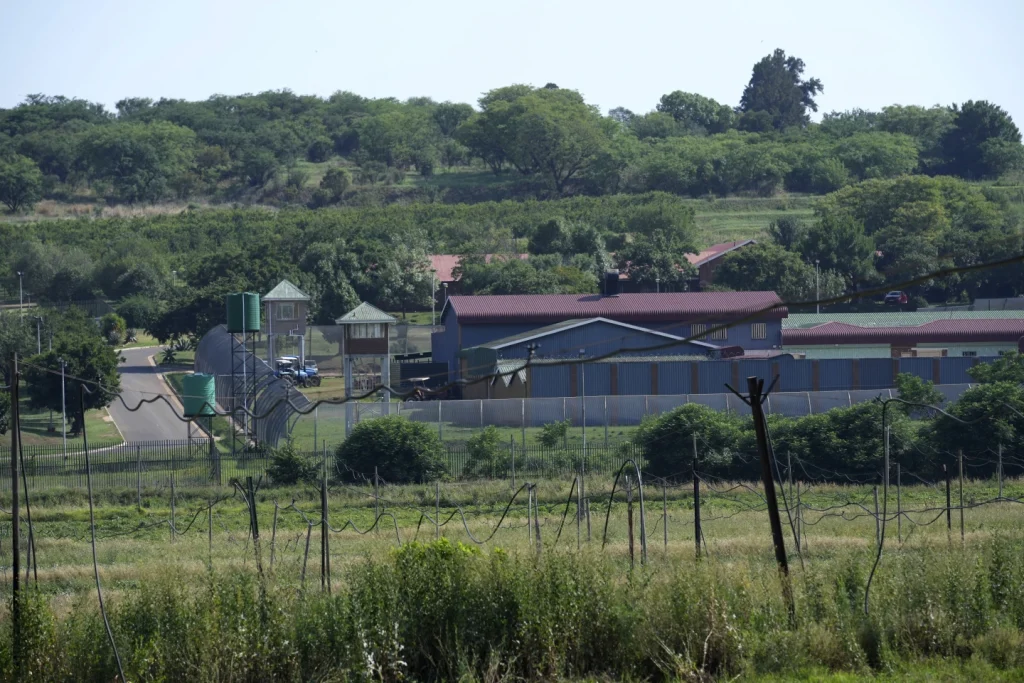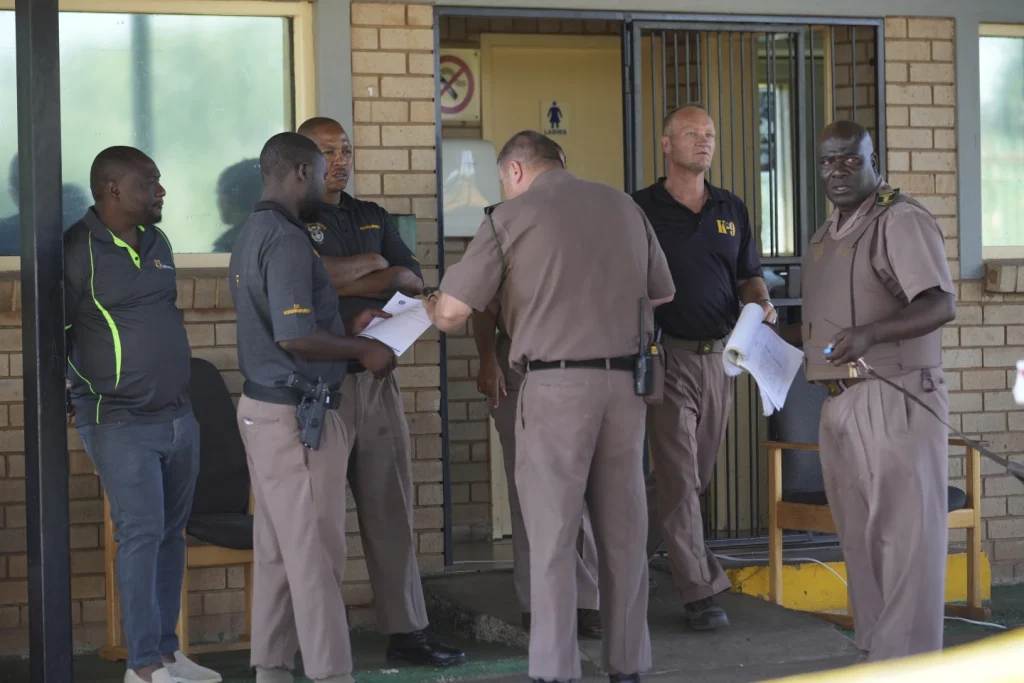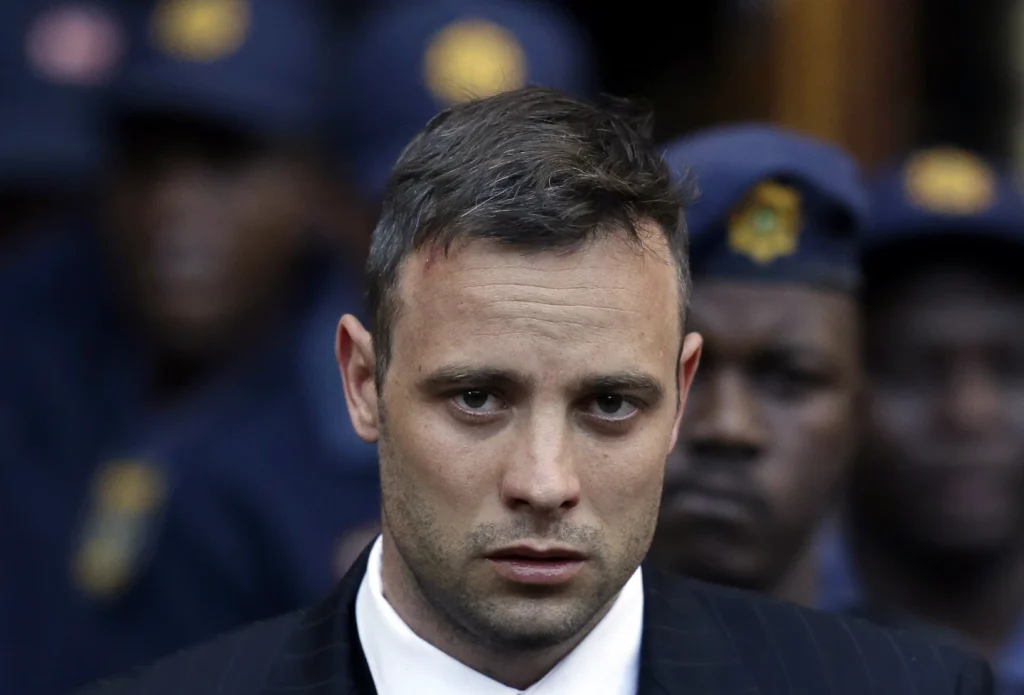On Friday, Oscar Pistorius could potentially be granted parole after serving nearly a decade in prison for murder in South Africa.
The former Olympic runner was once a celebrated athlete, but his life took a tragic turn when he fatally shot his girlfriend multiple times through a toilet door in his home on Valentine’s Day in 2013.
Pistorius was convicted and sent to prison in 2014, but a recent error made by an appeals court regarding his eligibility for early release has given him a second chance at parole in just eight months.
Now 37 years old, Pistorius’s case has garnered international attention and sparked debates about justice, rehabilitation, and the consequences of violent crimes.
The case of Oscar Pistorius and the killing of Reeva Steenkamp has been the subject of intense scrutiny and legal proceedings.
Initially convicted of culpable homicide, a charge akin to manslaughter, Pistorius faced a significant legal battle as prosecutors sought to have the conviction overturned and replaced with a murder charge.
After a successful appeal, Pistorius was indeed convicted of murder, leading to further legal wrangling over the appropriate sentence.

The initial six-year sentence for murder was deemed insufficient by prosecutors, prompting them to appeal for a harsher punishment. Ultimately, Pistorius was sentenced to 13 years and five months in prison, marking the end of a protracted and highly publicized legal saga.
The case has raised important questions about the nature of justice, the appropriate punishment for violent crimes, and the complexities of legal proceedings in high-profile cases.
The parole eligibility requirements for serious offenders in South Africa are stringent, requiring them to serve at least half of their sentence before being considered for release.
In the case of Oscar Pistorius, he has fulfilled this requirement, having served the necessary portion of his sentence. The Department of Corrections has confirmed that Pistorius has completed all the programs outlined in his correctional sentence plan, indicating his compliance with the conditions set forth for his potential parole.
As the parole hearing approaches, the decision now rests with the parole board to determine whether Pistorius will be granted release.
Pistorius has consistently maintained that he mistakenly shot and killed Reeva Steenkamp, believing her to be an intruder in his home. However, the prosecution has argued that the shooting was a result of a heated argument between the two, leading to Steenkamp’s tragic death.
The parole board’s decision will be critical in determining the next steps for Pistorius and the ongoing legal proceedings surrounding this high-profile case.
It is indeed a complex and sensitive matter that Oscar Pistorius is up for parole 10 years after the tragic killing of his girlfriend, Reeva Steenkamp.

The legal principle of dolus eventualis, under which Pistorius was convicted of murder, implies that he acted with extreme recklessness and should have been aware that his actions could result in someone’s death. This is a serious and grave offense, comparable to third-degree murder.
The fact that June Steenkamp, Reeva’s mother, has chosen not to oppose Pistorius’ parole is a significant development. It is understandable that she has expressed her inability to face Pistorius at this stage, given the emotional toll that this tragic event has taken on her.
Her statement, read out by a family friend, clearly conveys her disbelief in Pistorius’ version of events and her unwavering belief that he knew it was Reeva behind the door.
The parole boards in South Africa have a challenging task ahead of them as they consider Pistorius’ case. They must take into account a wide range of factors, including his conduct in prison, his mental health, and the potential risk he may pose to the community upon release.
There are different forms of parole available, such as full parole or day parole, each with its own set of conditions and requirements.
This case serves as a poignant reminder of the devastating impact of domestic violence and the importance of holding individuals accountable for their actions.
It is crucial that the parole board carefully weighs all the factors at play and makes a decision that prioritizes justice and the safety of the community.
The consequences of their decision will be far-reaching, and it is imperative that it is made with the utmost care and consideration.
It is no doubt a complex issue when it comes to Oscar Pistorius being up for parole 10 years after the killing of his girlfriend, Reeva Steenkamp.

The Department of Corrections has made it clear that if he is granted parole, his release may not be immediate and it is up to the parole board to determine the placement date.
If released, Pistorius is expected to live at his uncle’s luxurious mansion in a wealthy Pretoria suburb, where he stayed during his murder trial. This raises concerns about the fairness of the justice system and the potential for special treatment of high-profile individuals.
Pistorius was initially sent to Pretoria’s central prison, a notorious apartheid-era jail, before being moved to the city’s Atteridgeville Correctional Centre in 2016. The fact that he has spent the past decade behind bars is a testament to the severity of his crime.
There have been only occasional glimpses of Pistorius’ life behind bars over the past decade. His father has said he has been holding bible classes for fellow prisoners, which is commendable.
However, there have also been reports of trouble, including an altercation Pistorius had with another inmate over a prison telephone that left him requiring medical treatment.
It is important to remember that Steenkamp’s killing happened when Pistorius was at the height of his fame and just months after he had become the first double-amputee to compete at the Olympics.
He was also a multiple Paralympic sprinting champion and one of sport’s most marketable figures, having overcome the amputation of both his legs below the knee as a baby to run on specially designed carbon-fiber blades.

Ultimately, the decision on whether or not to grant Pistorius parole is a difficult one. On one hand, he has served a significant amount of time in prison and has reportedly been making efforts to rehabilitate himself.
On the other hand, his crime was a heinous one and it is important that justice is served for the victim and her family. Whatever the outcome, it is crucial that the justice system is seen to be fair and transparent, without any special treatment for high-profile individuals.
At his highly publicized and sensational trial, prosecutors presented compelling evidence that proved there was another side to Oscar Pistorius’ life, one that involved guns and violent confrontations with others.
The evidence presented painted a picture of a man who was quick to anger and prone to using firearms as a means of intimidation.
Despite his status as a celebrated athlete and role model, the evidence revealed a darker side to Pistorius’ persona, one that was at odds with his public image.
Moreover, Pistorius was also found guilty of a second charge of recklessly firing a gun in a restaurant, further highlighting his reckless behavior and disregard for the safety of others.
This verdict sent shockwaves through the international community and raised serious questions about the true nature of Pistorius’ character.

It is indeed a significant development that South African Olympic runner Oscar Pistorius is up for parole 10 years after the tragic killing of his girlfriend.
The case of Pistorius has been a highly publicized and controversial one, and his potential release on parole raises important questions about justice, rehabilitation, and public safety.
The details of Pistorius’ trial and the arguments made by prosecutors are certainly troubling. It is deeply concerning to hear about the allegations of guns and angry confrontations, as well as the second charge of recklessly firing a gun in a restaurant.
These details paint a disturbing picture of Pistorius’ behavior and raise serious doubts about his suitability for release on parole.
It is crucial for the parole board to carefully consider all aspects of Pistorius’ case, including his behavior during his time in prison, his potential for rehabilitation, and the risk he may pose to the public if released.

The parole decision must prioritize the safety and well-being of the community, as well as the need for accountability and justice for the victim and her loved ones.
Ultimately, the parole decision for Pistorius must be based on a thorough and objective assessment of all relevant factors.
It is essential that the parole board takes into account the seriousness of the crimes for which Pistorius was convicted, as well as the impact of his actions on the victim’s family and the wider community. Any decision regarding his parole should be made with the utmost care and consideration for the broader implications and consequences.
